Iran stands firm on Hezbollah support amid rising pressure
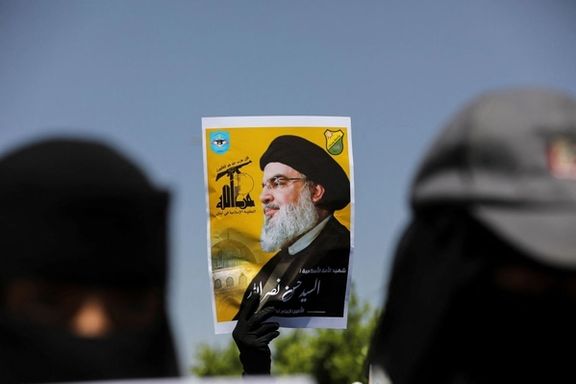
Iranian officials, during the commemoration of Hezbollah leader Hassan Nasrallah in Lebanon, doubled down on their support for the group amid escalating pressures from the US and Israel.

Iranian officials, during the commemoration of Hezbollah leader Hassan Nasrallah in Lebanon, doubled down on their support for the group amid escalating pressures from the US and Israel.
"The Islamic Republic of Iran, despite all opposing statements, firmly supports the resistance in the region, and this is a definitive decision," said Saturday Iran’s ambassador to Lebanon, Mojtaba Amani.
Senior Iranian official Vahid Jalalzadeh backed this position, portraying Hezbollah as a key player in Lebanon’s trajectory. "Today, in this place, we announce that we are witnessing the defeat of the enemy," he said, describing the group's ongoing struggle amid regional tensions.
Iran’s renewed backing comes at a time of crisis for Hezbollah. During Israeli strikes last year, the group suffered some of its worst losses in years. In a series of coordinated attacks in September and October, thousands of Hezbollah operatives were eliminated through targeted explosions and airstrikes. Key figures, including Nasrallah himself, were killed, dealing a severe blow to the group’s leadership and command structure.
The funerals of Hezbollah Secretary General Hassan Nasrallah and Executive Council Chief Hashem Safieddine will take place on Sunday, February 23, according to Al Hadath.
Meanwhile, Israel has accused Iran of funneling millions of dollars to Hezbollah through secret cash deliveries. According to a Wall Street Journal report, Iranian envoys have been flying into Beirut with suitcases stuffed with US dollars, while Turkish nationals have allegedly been acting as couriers to transfer additional funds from Istanbul. These allegations have been raised in formal complaints to the US-led ceasefire committee, though existing ceasefire terms focus on arms smuggling rather than financial transactions.
Washington, too, is increasing pressure on Lebanon’s leadership. As Prime Minister-designate Nawaf Salam assembles his cabinet, US officials are urging Lebanese leaders to prevent Hezbollah or its allies from controlling key positions, particularly the finance ministry. US diplomats have warned that Lebanon’s ability to secure vital international aid for post-war reconstruction could be at risk if Hezbollah maintains its political grip.
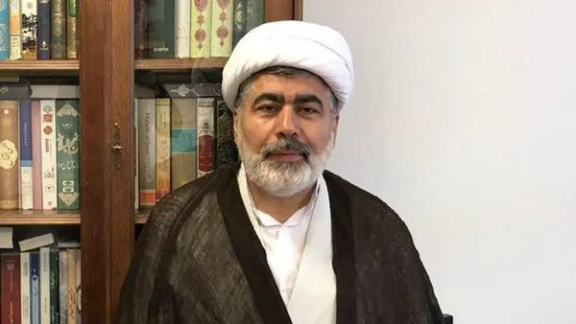
An Iranian cleric, an imam at an Islamic Center in suburban Stockholm, has been arrested for nearly two weeks and faces deportation from Sweden, Expressen reported Friday.
Almost two weeks ago, individuals in civilian clothing went to the home of cleric Mohsen Hakimollahi at midnight and took him away, a close associate told Expressen.
“He has been missing for more than ten days and we learned through various channels that he is in one of the Swedish Migration Board's detention centers and will soon be deported from the country,” added the source.
The Imam Ali Islamic Center, considered the largest Shiite institution in Northern Europe, has not issued a public statement on the matter.
Hakimollahi, aged 63, was transferred from Iran to Sweden to manage the Shiite center and had resided in the country for several years, developing connections with local political figures and religious organizations.
He was initially granted a temporary work permit in 2011, which was renewed three times prior to him obtaining permanent residency in 2017. However, that status has now been taken away.
"I can confirm that we are not conducting any preliminary criminal investigation connected to this individual," said Gabriel Wernstedt, spokesperson for Sweden’s Security Service (Säpo).
Wernstedt explained that Sweden's security police can apply special laws to counter security threats to the country. These laws allow authorities to detain non-citizens until their deportation. Such decisions are made based on various intelligence assessments.
In a separate development, the Swedish TV channel, TV4 Nyheterna, reported on Tuesday that Rouzbeh Parsi, of Iranian origin and the head of the Middle East program at the Swedish Institute of International Affairs (UI), communicated with authorities in Tehran who actively sought to amplify official Iranian foreign policy talking points in Western policy circles. Parsi later rejected the accusation. However, his brother, Trita Parsi in the US is known as a supporter of Tehran's foreign policy positions.
The detention of the cleric occurs after years of strained relations between Iran and Sweden, after 2019 when Sweden apprehended and sentenced Hamid Nouri, a former Iranian prosecutor for his involvement in the 1988 mass executions of political prisoners in Iran.
After serving five years of a life sentence, Nouri was swapped for a Swedish diplomat and an Iranian-Swedish national held in Iran on what human rights organization said were fabricated charges.
Another Iranian-Swedish individual, Ahmadreza Jalali, is still in custody in Iran facing a death sentence.
Hakimollahi’s phone has been inaccessible since his detention, and Expressen's attempts to contact his family for a statement have been unsuccessful.
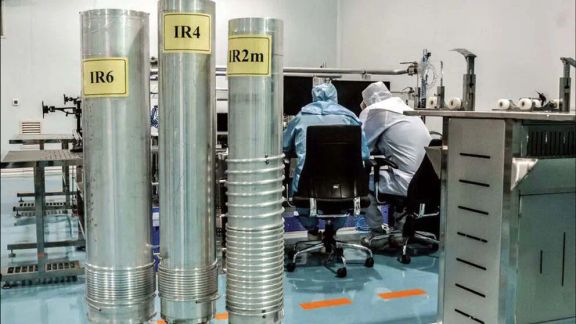
A Senate resolution introduced on Friday urges Washington and its allies to maintain a firm stance, ensuring that all possible options remain available against the threat of a nuclear-armed Iran.
Led by Senator Lindsey Graham (R-SC), the bipartisan resolution was co-sponsored by Senators John Fetterman (D-PA) and Katie Britt (R-AL), alongside Representatives Jared Moskowitz (D-FL) and Mike Lawler (R-NY).
“If the Iranian Ayatollah and his henchman obtain a nuclear weapon, it would be one of the most destabilizing and dangerous events in world history,” Graham said in a statement. “They are trying to acquire a nuclear weapon as part of their religious agenda to purify their faith, destroy the Jewish State, and drive Westerners out of the Middle East.”
During his first term in 2018, President Donald Trump withdrew from the Obama-era JCPOA nuclear deal, demanding greater concessions from Tehran. The Biden administration later spent 18 months in indirect talks with Iran to negotiate a new agreement, but the effort failed. Now, Iran has enough enriched uranium to produce four to five nuclear warheads in a relatively short time.
The resolution does not explicitly authorize the use of military force, but it affirms that Iran’s nuclear ambitions must be met with strong opposition. It also calls on Iran to immediately cease uranium enrichment, the development of nuclear warheads, and the possession of delivery systems capable of carrying such weapons.
Although Trump and his aides have taken a tough stance on Iran's nuclear threat, they have not outlined their plans for the coming months. It remains to be seen whether he will tighten economic sanctions or pursue negotiations.
Fetterman stressed the urgency of the issue, saying that “Iran’s pursuit of nuclear weapons is a threat we cannot ignore.” He added, “The United States, Israel, and our allies cannot afford to sit back while the Iranian regime continues down this dangerous path. This resolution sends an unmistakable message: all options are on the table to prevent a nuclear-armed Iran.”
Britt doubled down, insisting that a firm foreign policy is the key to keeping Iran in check. “Peace is achieved through strength, and our resolution sends an important bipartisan message to Iran that the US will not tolerate Tehran’s aggression,” she said.
Moskowitz described Iran’s nuclear ambitions as an unacceptable escalation that poses a direct threat to the security of the US and its allies. “Iran must dismantle its nuclear program now. This resolution makes clear the United States won’t stand for anything less and will consider all options to protect our national security,” he said.
Lawler also warned of the consequences of a nuclear-armed Iran, calling it a danger “not only to our closest ally, Israel but also to the whole world.” He added, “We must keep all options on the table when it comes to dealing with this unprecedented situation.”
Also on Friday, an exiled Iranian opposition group presented what it described as evidence that Tehran is secretly developing nuclear-capable warheads for missiles capable of reaching Europe.
At a press conference in Washington, DC, the National Council of Resistance of Iran (NCRI) pointed to the Shahroud missile site in northeastern Iran, where it said the Islamic Republic is working on nuclear warheads for solid-fuel missiles with a range of over 3,000 kilometers (1,864 miles).
The NCRI attributed the information to its network of sources inside Iran but did not provide further details on the evidence.
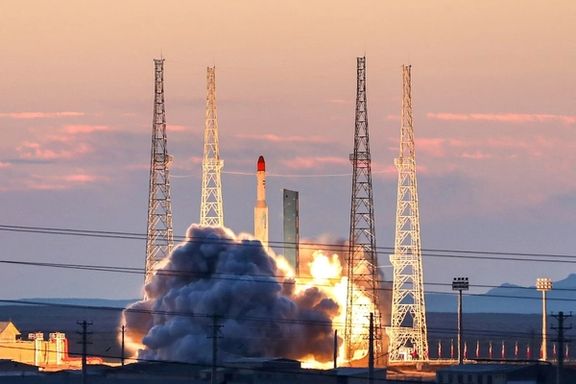
An Iranian exiled opposition group announced on Friday it has evidence showing the Islamic Republic is secretly developing nuclear-capable warheads designed for missiles that can reach Europe.
The Islamic Republic is developing nuclear warheads for solid-fuel missiles with a range exceeding 3,000 kilometers (1,864 miles) at the Shahroud missile site in northeastern Iran, the National Council of Resistance of Iran (NCRI) said in a press conference in Washington DC.
The group cited the source of the allegation as its network of members inside Iran, without elaborating.
"Additionally, a missile facility on the outskirts of Semnan, approximately 220 kilometers east of Tehran, is working to produce liquid-fuel missiles with nuclear warheads," the group announced on Friday. "This effort is being directed by the Organization for Advanced Defense Research (SPND), the entity established to consolidate Iran’s nuclear weapons activities."
Tehran denies seeking nuclear weapons and says it is engaged in peaceful scientific research. The US Central Intelligence Agency assessed last year that Iran has not yet decided to pursue a bomb but Israel says it believes Tehran seeks nuclear arms.
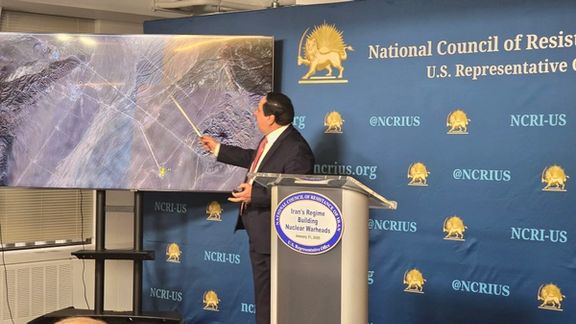
On August 14, 2002, the NCRI drew worldwide attention when it publicly accused Iran of clandestinely developing nuclear weapons during a similar press conference in Washington DC.
At that time, the group's spokesman Alireza Jafarzadeh said two secret nuclear facilities were being constructed in Iran at Natanz and Arak under the guise of front companies involved in the procurement of nuclear material and equipment.
Now more than 22 years later, Jafarzadeh once again appeared before media representatives to share information on how the Islamic Republic is allegedly camouflaging its nuclear weaponization efforts in Shahroud and Semnan missile sites as a satellite launching initiative.
"SPND is particularly dedicated to creating nuclear warheads for the solid-fuel Ghaem-100 missiles, which are equipped with mobile launch platforms at the Shahroud site and building liquid fuel missile Simorgh to develop nuclear warheads in Semnan," the NCRI said in a statement shared with Iran International.
Last October, Israel launched airstrikes against multiple Iranian sites including Shahroud's Space Center. Satellite images reviewed by the AP showed a central, major building at the Shahroud Space Center had been destroyed.
Iran's defense minister, however, denied damage to the Shahroud facility that builds ballistic missiles and launches rockets as part of the IRGC's space program.
In September, a report by the Institute for Science and International Security (ISIS) alleged that Iran has increased its activities at two nuclear sites, Sanjarian and Golab Dareh, that were key to its early nuclear weapons program two decades ago.
The report was based on satellite imagery given to the institute by Western intelligence officials, who say that in the past 18 months, Iranian experts who were involved in Iran’s alleged weapons-related projects in the early 2000s have been back at work at two secret sites.
The two sites mentioned by the ISIS were central to Iran’s alleged attempts to develop and test devices and systems that could be used to build a nuclear weapon, the report said.
Tehran has been brought before the Security Council repeatedly from 2007 to 2010 and faced several resolutions condemning the program and expanding international sanctions. However, military action against Iran's nuclear program may prevail over political and diplomatic pressure.
Over the past few weeks, Iran has been launching a series of military drills, including exercises focusing on protecting key nuclear sites such as Natanz and Fordow.
Israeli officials have reiterated the possibility of military action against Iran’s nuclear program. On Thursday, Omer Dostri, spokesman for Prime Minister Benjamin Netanyahu, told The Jerusalem Post that while Israel prefers a diplomatic solution, it doubts Iran will comply.
“War is one way to achieve our objectives. If Iran halts its nuclear ambitions without an Israeli strike, fantastic,” he said. “But we do not expect that to happen.”
Dostri also said Israel hopes to work with Trump to restore his maximum pressure policy, which had imposed severe sanctions on Iran.
While Trump has suggested he may seek a diplomatic solution, Dostri made it clear that Israel is ready to act alone if needed. “We’ll give it a chance, but the clock is ticking. If necessary, we will act – with or without American approval.”
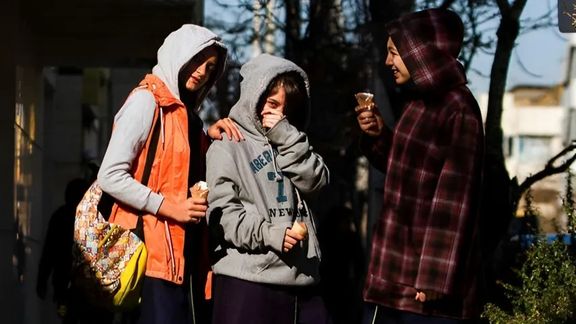
The clerical establishment in Tehran has lost the battle for the hearts and minds of Generation Z and hopes now to win the loyalty of Gen Alpha, Middle East analyst Holly Dagres told Iran International.
"It's really a battle of generations," said Dagres, a senior fellow at think tank the Washington Institute's Iran program.
"Gen Z, Gen Alpha as well, as they come of age, are really pushing back against the Islamic Republic's norms and they're really trying to take back their country. Whether they succeed is another thing."
Dagres, who specializes in Iranian youth and curates the newsletter the Iranist, said the Iranian government realizes they may have already lost Gen Z so are staking their hopes for staying in power on their successors.
“They've been actually looking at the next generation, which is Gen Alpha."
"When they came up with the song Salam Farmandeh or Salute Commander. Mostly when you see kids it's Gen Alpha kids that are part of the regime choirs and also they're being forced to sing it at schools."
Gen Z, or those born between 1997 and 2012, make up less than 7 percent of the population but were at the forefront of the 2022 Woman, Life, Freedom uprisings demanding women's rights and the end of the Islamic Republic.
Though the protests were largely stamped out, the generation remains restive.
“(Tehran is) having to think ahead because really they're struggling and I think the prime example of how they struggled here was the Woman, Life, Freedom uprising itself. It was led by Gen Z girls and women,” said Darges.
The Islamic Republic is thinking outside the box, appealing to Persian nationalistic motifs to form the minds and win the battle of the new generation.
“They've made a play about the Shahnameh or the Book of Kings. They're really trying to tap more into Iranian nationalism, which is much more palatable to the average Iranian, regardless of age these days than more Islamic motifs," said Dagres.
A recent viral video showcases a reporter asking Gen Zs to identify the clerics in photos they presented. The girls could not tell the difference between Iran’s current Supreme leader Ali Khamanei and the founder of the Islamic Republic Ruhollah Khomeini.

The kids had no problem identifying K-pop bands and Billie Eilish, however. The moment illustrated how little interest the youth have in their rulers.
Iran’s Gen Z formed a counterculture, the opposite of what the government was trying to force onto them, consuming Western music, movies all in an underground way, Dagres said. But they are not afraid to showcase their color dyed pink hair and skateboards.
The fact that women and girls are increasingly not wearing the mandatory hijab, she said, showcases the subtle ways Iranians are resisting.
In a scene which went viral online, a group of Iranian schoolgirls raised their middle fingers at a portrait of Iran's leaders in a classroom, in another sign of sharp defiance.
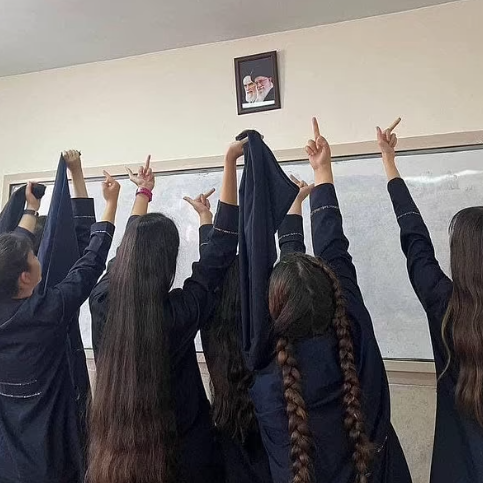
Authorities used extreme force to quell their rebellion after the death in morality police custody of a young Gen Z'er, Mahsa Jina Amini, in 2022.
Sham trials, confessions forced through torture and a wave of executions in 2022-23 claimed the lives of many of their number, including 23-year-old Mohsen Shakari and Majidreza Rahnavard, both promising youths hanged for their activism.
Declining marriage and birth rates
Gen Z is also the generation that is coming of age and often holding off on getting married and have children.
So much of that is a result of their connection to less traditional Western culture, but also high unemployment, concerns over climate change, inflation in Iran and a rejection of Islam and tradition, Dagres said.
Islamic Republic officials say that by the year 2101 the population in Iran will halve even as neighboring countries experience rising birth rates.
Iran’s once-youthful population is aging fast. That has stirred concerns over a lopsided economy and a potential healthcare collapse in the future.
The United Nations (UN) projects that by 2050 one-third of Iranians will be 60 or older, representing a three-fold increase from 2021.
Iran’s Ministry of Science has called for the removal of educational content deemed to discourage people from having children to combat declining birth rates.
The average Iranian household went from 6 per family to three and now a growing number of youths are choosing to live with their partners.
It is a phenomenon in Iran called white marriage, where two unwed people live together, replacing the traditional marriage proposal where families would help set up relationships.
The latest findings from the state-run National Population Research Institute suggest the number of registered marriages in Iran has dropped dramatically since 2011 with almost half a million marriages registered - a fall from the peak of 891,627 marriages in 2010.
The Rejuvenation of the Population and Protection of the Family (RPPF) law, enacted by the Iranian Parliament in 2021 under a directive from Supreme Leader Ali Khamenei, imposes penalties for actions deemed to discourage marriage and childbearing.
Iranians struggling with depression
Depression is rife in Iran, Dagres said, with Iranians now turning to drugs like opium and alcohol which is haram or religiously banned to ease the pain. The economic hardships and day-to-day repression lead to their depressive state.
“Some of these Gen Z'ers are so desperate for a hit of alcohol because they become so addicted that they're purchasing ethanol from a pharmacy and drinking it," said Dagres.
With the demographics of Iran dramatically changing, Gen Z appears to have largely decided to seek change, and the Islamic Republic's influence over Gen Alpha has yet to be felt.
Only time will tell what sort of future the youth of Iran will achieve.
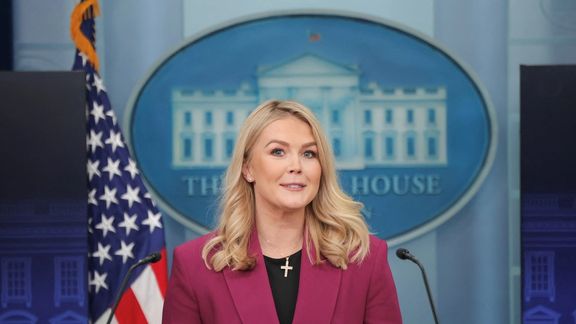
Iran has been deterred, and a Gaza ceasefire has held due to President Donald Trump's warning of dire consequences if Tehran-backed Hamas refused to release Israeli hostages, the White House said Friday.
Trump's new press secretary Karoline Leavitt was asked by a reporter whether her boss would pursue means short of military action to topple Iran's ruling system.
"I think the President has actually made his position on Iran very clear, and he made that clear when there were the negotiations about the ceasefire, which we know obviously is now in place, and the deadline on that ceasefire has continued," she replied.
Trump had said on Jan. 7 that "all hell will break out in the Middle East” if Hamas failed to ink a deal to release Israeli hostages the Palestinian group funded and armed by Iran abducted in an Oct. 7, 2023 attack.
"He said that Hamas and Iranian-backed terrorists would have hell to pay if that ceasefire didn't move forward, and then quickly thereafter it did," Leavitt added.
Trump has said that Iran cannot be allowed to possess nuclear weapons but has suggested his administration will not seek to overthrow the Islamic Republic.